- Home
- Terry C. Johnston
Crack in the Sky tb-3 Page 3
Crack in the Sky tb-3 Read online
Page 3
With her back turned toward him, for the longest time Bass contented himself to watch her sway gently back and forth in time to her half-whispered song as she repeatedly poked her bone awl through a piece of smoked leather, then drove the end of some sinew through the hole, down and through over and over again, tightening each stitch with a tug of her deft fingers.
He so surprised her the moment he asked for water that she stabbed herself with the awl.
But as soon as she whirled on him with a startled jerk, placing that bleeding fingertip to her lips where she licked at the blood—Bass’s mouth went dry. Finding himself pasty-tongued as he looked into those eyes that reminded him so much of Marissa Guthrie’s, that settler’s daughter back along the river south of St. Louis.
“What’s her name?” he had asked Hatcher later.
“Like that’un, eh?” Jack had said, his merry green eyes twinkling with devilment. “Some punkins, I’ll say.”
Now he was growing testy. “Her name, dammit.”
“Pretty Water,” Hatcher answered with a grin forming. “Got stabbed, did ye?”
“Stabbed?”
“Yer heart, nigger. Got stabbed in yer heart!”
As Titus lay there now in the cold and the dark, listening to the discomfort of the others on the ground, to the night sounds of their horses and the closeness of wild critters who owned this forest, Bass had to admit she had stabbed him in the heart.
Women. They had long been his weakness. How they preyed upon his heart, pierced him to his soul. Time and again hadn’t they loved holding a mirror up to his life, showing him just how weak he truly was. Not strong at all … oh, no. Women—like Amy, and Abigail, and Marissa. Then Fawn had renewed his faith in himself and the gentler sex—the sort of woman who unconditionally gave more than she got. Strange how she hadn’t expected any more from him than what he was prepared to give during their brief time together that first winter with the Ute.
A sudden lick of shame flushed through him.
What right had she to expect that he would stay on when spring freed the mountain passes and softened the ice clogging the high country streams where the flat-tails were awaiting the beaver men and their iron traps? A man simply didn’t pack along a woman, not a beaver man like Titus Bass. Come winter, was the time for bedding down with a woman, lying back in a lodge … maybeso a quick tangle or two with some likely gals come rendezvous when the sun was summer-high. A fella just had no business, no real need, to pack along a full-time night-woman. Looking after himself and his animals, his weapons and his traps, was truly more than enough to keep a man’s attention. That, and constantly watching over his shoulder, or the skyline ahead, for brownskins.
Man didn’t need no woman giving him the willies the way they sometimes did, taking his mind right off of what he should be keeping his mind to.
And Pretty Water was just that sort of woman. The kind that would steer a man’s mind off of near everything but coupling with her.
He felt his flesh stir here in the darkness at this remembrance of her. Of lying with her beneath blankets or robes as he healed from his wounds that terrible autumn. Her gentle touch mending all those places where his flesh was slowly knitting. And by the time she had come to ask him why he did not want her for his wife, he knew a smattering of Shoshone—just enough to really botch his trying to explain to her why he could not marry her.
How those big cow eyes of hers had pooled and spilled before she’d bit her trembling lower lip, turned, and dived out the lodge door.
For days Pretty Water did not return, her place taken by others who politely pretended not to hear when he asked of her. At last one of the old women told him he was healed. Time for him to rejoin the white men who had returned that very day to follow the Shoshone village through winter while Bass grew stronger. Time, the old woman told him, to forget about Pretty Water. She would never be his.
But how he longed for her again this night.
Wasn’t a man really a fool for allowing a woman to entangle herself around him so tightly? Damn—but why had God made them the sort of creatures what smelled so good, their fragrant flesh like downy velvet, all the soft and rounded curves of them rising and falling through hills and valleys?
He craved a woman, but of a time he convinced himself he didn’t want one. Oh, how maddening God had made this clumsy dance between the sexes! And in the end, how truly weak a man proved to be in the face of all the tricks and ploys a woman could pull on him.
Those last weeks among the Shoshone had been particularly hard without her. As the days passed, he had grown more and more restive, eager to take to the trail, to be gone from her, anywhere. Keeping to himself by and large so he would not have to chance upon her, until at last that morning arrived when Hatcher had moved out with his small brigade.
Someone stirred there in the black of night. Bass opened his eyes. Hatcher stood, blotting out part of the starshine above them. Nearby Fish and Wood slowly peeled themselves off their beds of cedar boughs and sagebrush. Sleeping right against the cold ground itself could stove up a man, stiffening his joints, paining his bones. Better for him to put some cushion between himself and the cold, bare ground.
What a fool he had been, Titus brooded as he sat up and volved his shoulders slowly. Remembering how ashamed he was when Goat Horn had brought his Shoshone warriors to pull the trappers’ fat out of the fire, pitching into the Blackfoot raiders who had the white men surrounded. Ashamed that he had been so demented to actually wonder if Pretty Water might have come along with the Shoshone war party. How reasonable it had seemed—since the village knew the warriors were coming to rescue Hatcher’s men, she might well choose to ride along to see for herself that Bass was still alive … for a few moments at least he could hope.
But within heartbeats all hopes were dashed. No woman had accompanied the war party. And not one of the Shoshone came up to explain to him that Pretty Water had reconsidered her actions, that she was worried about his safety. That she cared enough—
“Let’s get those cinches tightened,” Hatcher whispered, puffs of vapor streaming from his lips as he straightened and worked the kink out of a bony knee.
Without a word the others came up from the dark, cold ground, stepped over to their horses, where they threw up the stirrup straps so they could retighten the cinches. Bass shifted the Indian style chicken-snare saddle the others had given him last fall, snugging its high pommel up against the withers before he tugged up on the buffalo-hair cinch and locked it down.
“How you figger this, Jack?” Wood asked.
“We’ll ride on down to the stream they camped by,” Hatcher began as if he had given it all the thought in the world. “Feel how the wind moves, then see if we can find where them red-bellies put their horses out to graze.”
Fish asked, “Come onto ’em from downwind?”
“Only way,” Jack replied. “Afore that, best we give some thought to taking care of ary a horse guard they throwed out.”
“How many you wager they might have out?” Bass inquired.
“Two, maybe. You?”
“That sounds about right,” Scratch answered. “I want one of ’em for my own self afore we put them ponies on the run.”
“Awright,” Jack said, his eyes glinting with starlight as he stared coldly at Bass. “You and me, Scratch. We’ll take care of the horse guard afore the rest of the boys here move in on them others.” He stuffed a foot into a stirrup and flung himself into the saddle. “I’ll lead out. Single file. Keep quiet as the dead.”
He reined away toward the far timber.
Bass rose to the saddle with the others, brought his horse around, and watched Hatcher’s back disappear into the dark. “Damn, if it ain’t quiet as the dead,” he repeated, in a whisper.
None of the rest saw how he shuddered in the dark as a lone drop of cold sweat spilled down his backbone.
By the time they had dropped off the ridge and worked their way down to the creek, Scratch could tell ho
w old the night had become, those early hours of morning when the temperature was at its coldest. When both man and animal normally slept their soundest.
Not this night.
The six moved slowly, cautiously, feeling their way upstream through the tall, horseman-high willow and buckbrush so they wouldn’t rustle or snap branches, alerting the enemy to their approach. Time and again they stopped, signaling back down their file with an arm thrown up, every man jack of them listening and smelling. More than half a dozen times already they had halted like that, when Hatcher finally cocked his head and sniffed at the cold wind more than usual, then swung his horse around sharply.
When he dropped to the ground, it was clear they had come as far as they were going to in the saddle until the moment arrived to escape with the horses. Jack stepped up to Caleb Wood, handing him the reins to his mount.
“Ye’ll see to my horse. Solomon, take the reins to Scratch’s pony. Things go the way I plan—the two of us rub out the herd guard—we’ll circle back here to join up with the rest afore we all ride in to whoop up a scare in them horses together.”
“You smell ’em, Jack?” Gray asked.
“I make the horses off yonder,” he answered, pointing north, away from the stream. “But I ain’t smelled no Blackfoot yet.”
“Mayhaps they’re camped on the far side of the herd,” Wood replied.
“Things’ll sit pretty if they are,” Hatcher stated. Then he fixed Bass with his eyes for a moment before he went on. “The rest of ye know what to do … if’n one or the both of us don’t come back in a bit.”
“We get the hell out of here,” Rowland declared. “There’s more Blackfoot camped in spitting distance than I ary wanna see—”
“No!” Hatcher snapped as he took a step closer to Rowland. “Don’t none of ye dare run off if things go mad. Ye finish just what we set out to do miles and miles ago.”
“We come for the horses,” Gray explained.
“Damn right we did,” Hatcher agreed. “Something happen to me—ye don’t leave ’thout them horses.”
Rowland wagged his head, saying, “But if they kill’t the two of you—”
“Then that just means they got their hands full for the time being,” Bass interrupted. “If them brownskins are busy taking what’s left of my scalp, boys—you damned well better see to riding off with their horses.”
Hatcher looked a moment into each face. “Ye all understand what Bass is saying? Hell breaks loose, me and Scratch here are on our own. Ye boys just get, and get fast. Ye drive off the ponies, why—Bug’s Boys in there won’t have ’em nothing to ride and no way to keep up with ye.”
“Can we count on you meeting us back to camp?” Wood asked hopefully.
Hatcher shook his head. “Something goes wrong—don’t count on seeing my mud-ugly mug again, Caleb. Just have ye a drink for me come ronnyvoo this summer.”
Caleb stepped forward, held out his hand to Hatcher in that sudden, shy sort of way. “Don’t do nothing stupid, Jack.”
“Like jumping more’n thirty Blackfoots by ourselves?” Hatcher snorted with a grin that always made the man’s mouth a wide and friendly bow. “Ain’t nothing stupid ’bout that, is there, boys?”
The four shook hands with the pair, who silently turned and disappeared into the willow on foot. Bass followed Jack, a slow step at a time, careful of their footing, toes feeling their way along in the dark, working this maze through the brush a yard at a time until Hatcher stopped and turned.
“This gonna be close-up work.”
“I know,” Titus whispered. He pulled the old knife from its rawhide sheath.
“Ye done this afore?”
Bass shook his head. “No. Not really.”
“Just like sneaking up ahin’t someone,” Jack explained. “Nothing much to it.”
“I figger there’s allays a first time,” Scratch said.
Hatcher smiled. “Just make sure ye’re around for a second time, friend. I come to like ye, Titus Bass.”
He laid his hand on the tall, thin man’s shoulder. “I come to like you some myself, Mad Jack.”
Hatcher held out his hand, and they shook swiftly, suddenly conscious once more of what lay before them. “I’m gonna work on past the herd to yonder where I figger they got ’em a second guard.”
“Where’s the first gonna be?”
Pointing, Jack said, “Not far, over by that ledge, I’d wager.”
“You want me to wait for you to get to the far side?”
“No. Ye kill that son of a bitch, and kill him quick. Sooner he’s dead, sooner we’re sure that one won’t make a sound to rouse the others.”
“Meet you back with the rest?”
“Less’n something goes wrong, Scratch,” he answered. “Then ye get the hell out of there the best way ye can.”
“Same goes for you, Jack. Something haps to me—see yourself that the boys split up what little I got to my name.”
He smiled quickly. “I awready got call on yer rifle, Scratch.”
“And my mule too?” Titus asked with a grin.
“Hell no, ye lop-eared dunderhead. Who the hell’d want that cantankerous bitch?”
An uneasy moment of quiet fell between them; then Titus said, “Watch your back, now, you hear?”
“Ye watch yer’n.”
Bass stared at the black hole among the tall willow where Hatcher had disappeared for what seemed like a long time. The breeze rustled the leafy branches around him as he endlessly tried to sort out sounds, like picking mule hair off a saddle pad, staring now and again at the dim form of the rocky ledge not all that distant. Then back again at the hole in the night Hatcher had punched through to disappear.
Scratch wondered, if it was so cold, then why in hell was he sweating the way he was?
2
Scratch Thought he heard the horse guard well before he ever saw him.
He stopped, listening intently to the dark. Listening not only with his ears, but with every inch of exposed flesh, his skin alive and prickling at the nearness of danger. He tried to remember to breathe, and when he did, Bass found the air shockingly cold. Sniffing deeply of the gloom, he thought he could smell the dried sweat, the days-old grease that told him the warrior was near. Or was it only his imagination, galloping wildly now that he was inching ever closer to this moment of reckoning?
Not that he hadn’t killed before. But this was something entirely different.
When violence confronted a man, it usually did so suddenly, without warning and forethought. One moment a man stood square with the world around him. And with his next breath, things went awry, everything off-kilter and askew in that instant. A man found himself swept up in the immediacy of the moment and responded to protect either himself or those dear to him. Just as he had done when the Chickasaw had slipped on board Ebenezer Zane’s Kentucky flatboat.
One moment he’s fighting off sleep with heavy eyes and the gentle bobbing of that flat-bottomed broadhorn laden with marketable goods bound for the port at New Orleans … and the next moment he’s shooting and stabbing, clubbing and slashing at the heathens who have stolen out of the night.
So this was the first time in his life that Bass ever had time to plan, to think, and to fret on it. Killing had always been what he had done when presented with no other choice. Now it became something altogether different, when he was no longer the one confronted by the violence created for him—now that he was the one slipping out of the dark. Not that these Blackfoot didn’t deserve to die, he reminded himself as he took another two steps forward … and suddenly saw the shape of the man.
Stopping almost in midstep, Bass held his breath a long moment. Waiting, he watched the warrior, studying to be sure there was no chance he might have been heard. Waiting to be certain the breeze was still in his face. He took another step, paused, then moved to within two short yards of the raider. The horses were just beyond him.
He leaned the rifle against a tree, wondering where Hatcher w
as. Wondering how long he should wait there before … how much time he would have before the warrior moved farther away, or the animals scented him, or all hell broke loose because one of the others were discovered.
Swallowing down the sharp-edged ball of thorny fear lodged in his throat, Bass brought both arms up, his left ready to snare the Blackfoot, the right hand filled with his old knife.
The horses brought their heads up suddenly as Titus was starting the knife back in its arc. An instant later a cry shattered the night. The Blackfoot in front of him visibly jerked, then started to wheel to his right, about to sprint off for camp. He spotted Bass at the same moment Scratch was lunging forward, his arm already swinging down in a frenzy, snatching hold of the Blackfoot’s war shirt, yanking the Indian close as the knife became a blur.
In that moment of the white man’s hesitation, the enemy managed to bring his forearm up. Bass’s wrist collided with it as the tip of the knife grazed the side of the warrior’s neck. But the Blackfoot’s right arm was free, grabbing for his own scabbard as they danced in a tight circle. The moment the man’s knife came up in that free hand, Titus shoved his enemy backward, slamming his knee into the warrior’s groin.
Stumbling a step, the warrior sought to protect himself as Scratch pursued him back, back—still holding on to the war shirt—yanking the warrior to the side as he raked his knife across the Blackfoot’s gut. He felt the sudden warm splash across his own cold hand.
Until now the enemy hadn’t made a sound; but this was something that reminded him of a grunt from the old plow mule, a little of the squeal. Sinking to his knees, the Blackfoot stared down at his hands, found them filling with the first purplish-white ribbons of gut spilling from the deep, savage wound. Dull-eyed, he looked up at the white man just as Bass heard the rumble burst free of his own throat: stepping forward to savagely slash the old knife from left to right across the enemy’s throat.

 Black Sun, The Battle of Summit Springs, 1869
Black Sun, The Battle of Summit Springs, 1869 Lay the Mountains Low
Lay the Mountains Low Black Sun: The Battle of Summit Springs, 1869 (The Plainsmen Series)
Black Sun: The Battle of Summit Springs, 1869 (The Plainsmen Series)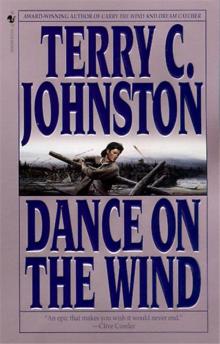 Dance on the Wind tb-1
Dance on the Wind tb-1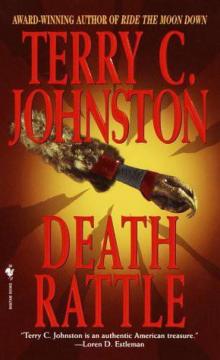 Death Rattle tb-8
Death Rattle tb-8 The Stalkers
The Stalkers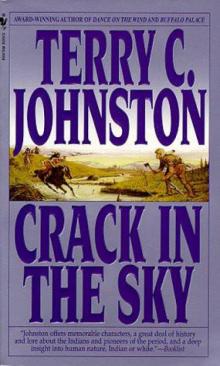 Crack in the Sky tb-3
Crack in the Sky tb-3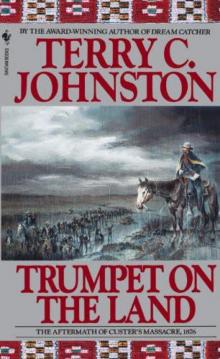 Trumpet on the Land: The Aftermath of Custer's Massacre, 1876 tp-10
Trumpet on the Land: The Aftermath of Custer's Massacre, 1876 tp-10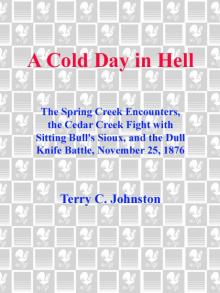 A Cold Day in Hell
A Cold Day in Hell Long Winter Gone: Son of the Plains - Volume 1
Long Winter Gone: Son of the Plains - Volume 1 Buffalo Palace
Buffalo Palace Cries from the Earth
Cries from the Earth Death Rattle
Death Rattle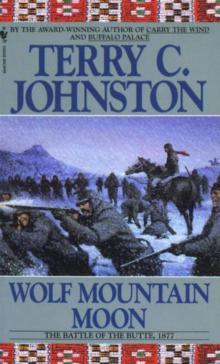 Wolf Mountain Moon: The Battle of the Butte, 1877 tp-12
Wolf Mountain Moon: The Battle of the Butte, 1877 tp-12 Crack in the Sky
Crack in the Sky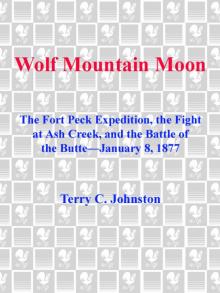 Wolf Mountain Moon
Wolf Mountain Moon Turn the Stars Upside Down: The Last Days and Tragic Death of Crazy Horse
Turn the Stars Upside Down: The Last Days and Tragic Death of Crazy Horse Winter Rain
Winter Rain Shadow Riders: The Southern Plains Uprising, 1873 (The Plainsmen Series)
Shadow Riders: The Southern Plains Uprising, 1873 (The Plainsmen Series)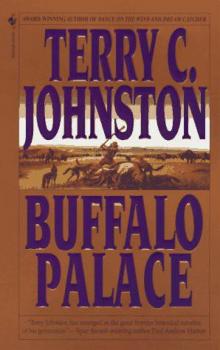 Buffalo Palace tb-2
Buffalo Palace tb-2 Cries from the Earth: The Outbreak Of the Nez Perce War and the Battle of White Bird Canyon June 17, 1877 (The Plainsmen Series)
Cries from the Earth: The Outbreak Of the Nez Perce War and the Battle of White Bird Canyon June 17, 1877 (The Plainsmen Series) Shadow Riders, The Southern Plains Uprising, 1873
Shadow Riders, The Southern Plains Uprising, 1873 Ashes of Heaven (The Plainsmen Series)
Ashes of Heaven (The Plainsmen Series) Ashes of Heaven
Ashes of Heaven Devil's Backbone: The Modoc War, 1872-3
Devil's Backbone: The Modoc War, 1872-3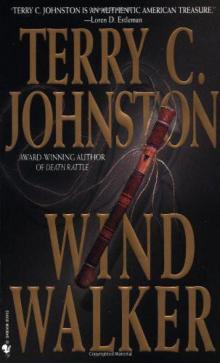 Wind Walker tb-9
Wind Walker tb-9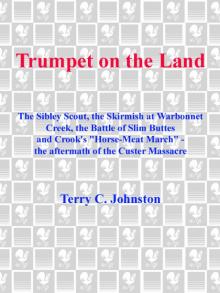 Trumpet on the Land
Trumpet on the Land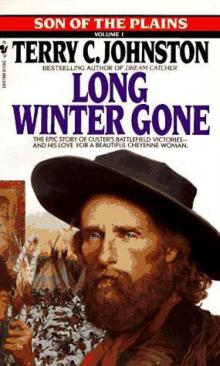 Long Winter Gone sotp-1
Long Winter Gone sotp-1 Dying Thunder
Dying Thunder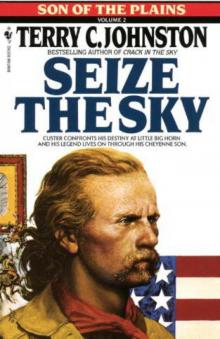 Seize the Sky sotp-2
Seize the Sky sotp-2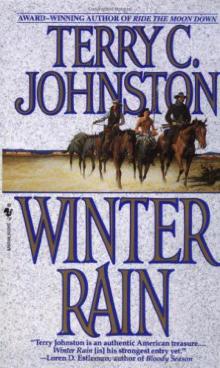 Winter Rain jh-2
Winter Rain jh-2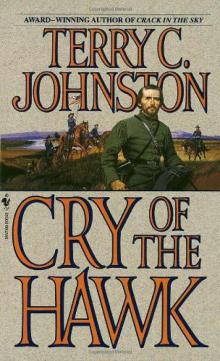 Cry of the Hawk jh-1
Cry of the Hawk jh-1 Sioux Dawn, The Fetterman Massacre, 1866
Sioux Dawn, The Fetterman Massacre, 1866 Sioux Dawn: The Fetterman Massacre, 1866 (The Plainsmen Series)
Sioux Dawn: The Fetterman Massacre, 1866 (The Plainsmen Series) Ride the Moon Down
Ride the Moon Down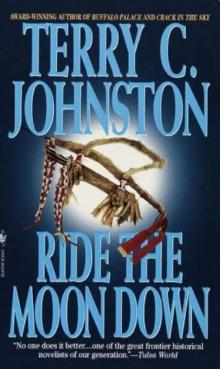 Ride the Moon Down tb-7
Ride the Moon Down tb-7 Red Cloud's Revenge
Red Cloud's Revenge Wind Walker
Wind Walker